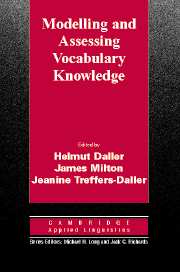Book contents
- Frontmatter
- Contents
- List of contributors
- List of abbreviations
- Acknowledgements
- Foreword
- Series Editors' Preface
- Editors' introduction
- I Fundamental issues
- II Vocabulary and learner differences
- III The unit of assessment and multiple vocabulary measures
- Chapter 4 Validity and threats to the validity of vocabulary measurement
- Chapter 5 Comparing measures of lexical richness
- Chapter 6 Productive vocabulary tests and the search for concurrent validity
- Chapter 7 Exploring measures of vocabulary richness in semi-spontaneous French speech
- Chapter 8 Lexical richness and the oral proficiency of Chinese EFL students
- IV Metaphors and measures in vocabulary knowledge
- V Vocabulary measures in use
- References
- Appendices
- Index
Chapter 8 - Lexical richness and the oral proficiency of Chinese EFL students
Published online by Cambridge University Press: 04 May 2010
- Frontmatter
- Contents
- List of contributors
- List of abbreviations
- Acknowledgements
- Foreword
- Series Editors' Preface
- Editors' introduction
- I Fundamental issues
- II Vocabulary and learner differences
- III The unit of assessment and multiple vocabulary measures
- Chapter 4 Validity and threats to the validity of vocabulary measurement
- Chapter 5 Comparing measures of lexical richness
- Chapter 6 Productive vocabulary tests and the search for concurrent validity
- Chapter 7 Exploring measures of vocabulary richness in semi-spontaneous French speech
- Chapter 8 Lexical richness and the oral proficiency of Chinese EFL students
- IV Metaphors and measures in vocabulary knowledge
- V Vocabulary measures in use
- References
- Appendices
- Index
Summary
Introduction
The aim of this chapter is to develop Nation's final concern discussed in the opening chapter of this book: that of the importance of testing vocabulary in use. We have a variety of lexical measures available to us and the differences between them suggest that they may be useful in different ways and in different circumstances. It is not always clear which measure is most useful in any given set of circumstances. Indeed, as Fitzpatrick's Chapter 6 (in this volume) has made clear, we often lack basic information on the use of these tests from which to draw a conclusion. In this chapter, therefore, we intend to investigate which measurement of lexical richness appears the most suitable for measuring oral proficiency of Chinese EFL learners. This is a specific task and one where the vocabulary knowledge that a learner can bring to bear should play an important role in their success in carrying out the task. It might be expected that some measures would be more suitable than others. What, then, are the measures available which might prove suitable?
A person's language proficiency is closely related to the size and depth of their vocabulary, and this is true of both first and foreign languages. The lexical richness displayed in an oral or written text is a result of this underlying vocabulary knowledge. The term lexical richness covers several aspects of vocabulary use (see Read, 2000: 200ff.) such as lexical diversity, which is ‘the variety of active vocabulary deployed by a speaker or writer’ (Malvern and Richards, 2002: 87).
- Type
- Chapter
- Information
- Modelling and Assessing Vocabulary Knowledge , pp. 150 - 164Publisher: Cambridge University PressPrint publication year: 2007
- 19
- Cited by



